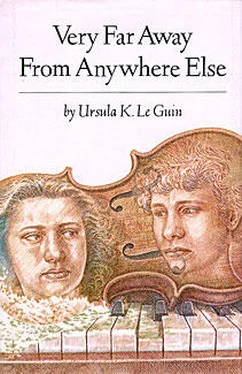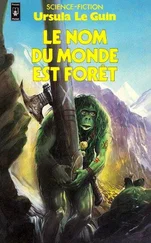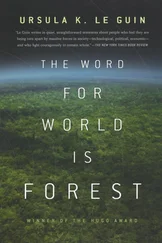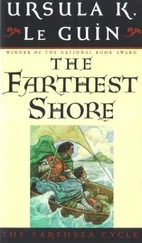Ursula Le Guin - Very Far Away from Anywhere Else
Здесь есть возможность читать онлайн «Ursula Le Guin - Very Far Away from Anywhere Else» весь текст электронной книги совершенно бесплатно (целиком полную версию без сокращений). В некоторых случаях можно слушать аудио, скачать через торрент в формате fb2 и присутствует краткое содержание. Жанр: Современная проза, на английском языке. Описание произведения, (предисловие) а так же отзывы посетителей доступны на портале библиотеки ЛибКат.
- Название:Very Far Away from Anywhere Else
- Автор:
- Жанр:
- Год:неизвестен
- ISBN:нет данных
- Рейтинг книги:5 / 5. Голосов: 1
-
Избранное:Добавить в избранное
- Отзывы:
-
Ваша оценка:
- 100
- 1
- 2
- 3
- 4
- 5
Very Far Away from Anywhere Else: краткое содержание, описание и аннотация
Предлагаем к чтению аннотацию, описание, краткое содержание или предисловие (зависит от того, что написал сам автор книги «Very Far Away from Anywhere Else»). Если вы не нашли необходимую информацию о книге — напишите в комментариях, мы постараемся отыскать её.
Very Far Away from Anywhere Else — читать онлайн бесплатно полную книгу (весь текст) целиком
Ниже представлен текст книги, разбитый по страницам. Система сохранения места последней прочитанной страницы, позволяет с удобством читать онлайн бесплатно книгу «Very Far Away from Anywhere Else», без необходимости каждый раз заново искать на чём Вы остановились. Поставьте закладку, и сможете в любой момент перейти на страницу, на которой закончили чтение.
Интервал:
Закладка:
I couldn’t stand the sight of any of the books in my room; I hated them. I went downstairs and said, “Going out for a drive,” around the ghost of that piece of beef, which still seemed to be in my mouth; and I went out and got into the new car. I had left the keys in it, Sunday. Even Dad hadn’t noticed. It could have been stolen any time during the last two days. If only it had been. I started it up and drove very slowly down the street. Breaking it in.
At the end of the second block I passed the Fields’ house.
OK, now I know I was sick—really sick, a little past the breaking point—that night, because of what I did. I did what any normal car-loving American teen-ager would do if he’d met a girl he liked. I stopped and backed up and parked in front of the Fields’ and went up to the front door and knocked and said to Mrs. Field, “Is Natalie here?”
“She’s practicing.”
“Can I see her for a minute?”
“I’ll ask her.”
Mrs, Field was a good-looking woman, older than my parents. She had the same severe expression Natalie had, but she was handsomer. Maybe Natalie would be that handsome at fifty. Kind of worn and polished like a piece of granite in a creek. Mrs. Field wasn’t friendly or unfriendly, welcoming or off-putting. She was calm. She just stated the facts. She stood aside—it was still raining—and let me into the hall; didn’t ask me in any farther; went upstairs. As she went, I heard Natalie practicing. It must be a violin, I thought. A tremendous noise, even though the Fields’ house was bigger than ours and older, with thicker walls. A big, sweet, hard, rushing noise, rushing down the scales like a creek over rocks, bright and fierce—and then it stopped. I’d stopped it.
I heard Mrs. Field upstairs say, “It’s the Griffiths boy.” She knew us mainly because mother had hooked her last spring for the March of Dimes, and she’d been at our house for the planning meeting.
Natalie came downstairs. She was frowning, and her hair was all messed up. “Oh hi, Owen,” she said from a distance roughly equivalent to the orbit of Neptune.
“I’m sorry I stopped you practicing,” I said.
“That’s all right. What’s on your mind?”
I had been going to ask her if she’d like to drive around some in my new car, but I couldn’t. I said, “I don’t know.”
And the ghost of the piece of pot roast came back and filled my entire mouth.
She looked at me, and after this long, horrible silence she said, “Is something wrong?”
I nodded.
“Are you sick?”
I shook my head. Shaking it seemed to clear it a bit. I said, “I’m upset. It’s something to do with my parents. And stuff. It’s not terminal. But I. But I wanted to talk. But I. But I can’t.”
She was kind of floored. She said, “Would you like a glass of milk?”
“I just ate dinner.”
“Camomile tea,” she said.
“Peter Babbit,” I said.
“Come on in.”
“I don’t want to interrupt you. Listen. Can I sit and listen to you practice? Would it bother you a lot?”
She hesitated, and then she said, “No. You want to? It’s dull.”
We went to the kitchen, and she poured me a cup of extremely weird tea, and then we went upstairs to this room. What a room. All the walls in the Fields’ house were dark, and it all looked kind of bare, kind of calm and severe like Mrs. Field, but this room was the barest. It had in it one Oriental rug worn down to the warp or whatever you call it so you could hardly see what colors it had been, and one grand piano, three music stands, and a chair. There were some stacks of music under the windows. I sat down on the rug. “You can sit in the chair,” she said. “I stand up to practice.”
“I’m fine here.”
“OK,” she said. “This is some Bach. I have to cut an audition tape next week.” And she picked up her fiddle off the piano and injected it under her jaw in that peculiar way violinists do—only I> figured out from the size that this one was a viola not a violin—and rubbed her bow with rosin and stared at the music on the music stand and started playing.
It wasn’t your standard concert performance. For one thing the room was so high and bare that it made the noise loud, hard, so that it sort of rang in your bones (she said afterwards it was a perfect room for practicing because she could hear all her mistakes). And she made faces and muttered a lot. And she would play the same bit over and over and over. That crashing run she’d been doing when I came in, she must have done it ten or fifteen times, sometimes going on from it, but coming back to it again, starting over. And every time it was slightly different. Until finally it came out the same twice in a row. She’d got it right. Then she went on. Then when she played the whole movement over, that part sounded the same the third time in a row. Right. Yeah.
It had never occurred to me before that music and thinking are so much alike. In fact you could say music is another way of thinking, or maybe thinking is another kind of music.
They talk about the patience scientists have to have, and how scientific work is 99 percent drudgery and repetition and neatness and making perfectly sure. And it is. I had a very good bio teacher last year, Miss Capswell, and she and I did some lab work after school in spring term. We were working with bacteria. It was exactly the same thing Natalie was doing with the viola. Everything had to be right. You didn’t know for sure what was going to happen when you finally did get it all right: you had to get it right to find out. Miss Capswell and I were trying to confirm an experiment reported in Science magazine last year. Natalie was trying to confirm what Bach had reported to some church congregation in Germany two hundred and fifty years ago. If she did it absolutely right, it might turn out to be true. To be the truth.
That was maybe the most important thing that happened to me that day—understanding that,
After about forty minutes of practicing, she started on a sticky fast part and fought with it for a while and got mad at it and went YAARKHH! on the strings and quit. She sat down on the rug too, and we talked. I told her what I had been thinking about music and thinking, and she liked it; but she asked didn’t a scientist have to keep feeling out of his thinking, whereas in music they were the same thing. That didn’t seem exactly right to me, but we couldn’t figure out just what did happen in science. I told her about working with Miss Capswell and how neat it had been, because this was the first person I had ever met who just took it for granted you were interested in ideas. Working with her in the lab had been just about the first time in my life I didn’t feel like an outsider, or self-conscious, or fake; and it was really because of that that I’d realized that no matter how I tried, I was never going to be an extravert, or popular, or one of the group, so I might as well quit trying. But Miss Capswell got transferred to another school over the summer, and when I came back in the fall, school was even worse than it had been before, in a way, because I wasn’t even tormenting myself with trying to be part of it any more, so there wasn’t anything left at all. I didn’t tell Natalie all that, that evening, of course. But we did talk some about school, about conformity and why it is hard to be different. She said it seemed like the only choices offered were to want to be what other people were, or to be what other people wanted you to be. Either to conform, or to obey. And that got me onto the car, and college, and my parents. She listened, and she understood perfectly about the car, but not so well about college. She said, “Well, OK, but you wouldn’t actually give up going to the place where you belong, and go to a school you don’t want? I mean, why?”
Читать дальшеИнтервал:
Закладка:
Похожие книги на «Very Far Away from Anywhere Else»
Представляем Вашему вниманию похожие книги на «Very Far Away from Anywhere Else» списком для выбора. Мы отобрали схожую по названию и смыслу литературу в надежде предоставить читателям больше вариантов отыскать новые, интересные, ещё непрочитанные произведения.
Обсуждение, отзывы о книге «Very Far Away from Anywhere Else» и просто собственные мнения читателей. Оставьте ваши комментарии, напишите, что Вы думаете о произведении, его смысле или главных героях. Укажите что конкретно понравилось, а что нет, и почему Вы так считаете.









